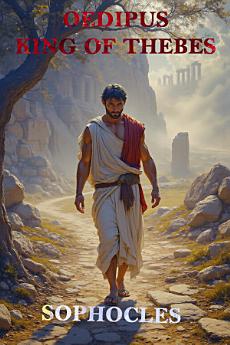Oedipus, King of Thebes
About this ebook
Set in the ancient city of Thebes, the play follows King Oedipus, a legendary ruler confronting a devastating plague that has struck his kingdom. Driven by his inherent nobility and intellectual curiosity, Oedipus embarks on a relentless quest to uncover the truth behind the city's suffering, unaware that his investigation will lead to his own catastrophic self-discovery.
Sophocles masterfully constructs a narrative that explores the complex interplay between human free will and divine prophecy. The story revolves around a prophecy that Oedipus will kill his father and marry his mother – a fate he attempts to escape by leaving his presumed birth parents. Ironically, his very actions to avoid this destiny become the mechanism of its fulfillment, creating a profound philosophical meditation on predestination and individual choice.
The dramatic tension builds as Oedipus gradually uncovers the horrifying truth of his origins. Adopted as a child, he learns that he unknowingly fulfilled the oracle's prophecy: he has indeed killed his biological father and married his mother. This revelation represents a pivotal moment in dramatic literature – a complex psychological unraveling that challenges fundamental concepts of identity, morality, and human understanding.
Sophocles' characterization of Oedipus is revolutionary. He is not a passive victim but an active, intelligent protagonist whose very virtues – his determination, intelligence, and moral courage – become the instruments of his tragic downfall. His relentless pursuit of truth, initially presented as a noble quest, ultimately leads to his complete psychological and social destruction.
The play's exploration of blindness – both literal and metaphorical – becomes a powerful symbolic motif. Ironically, Oedipus, who prides himself on his intellectual clarity, remains metaphorically blind to his true identity until the devastating moment of revelation. In a profound act of self-punishment, he subsequently blinds himself physically, transforming his internal psychological trauma into a literal manifestation.
Structurally, Oedipus, King of Thebes represents the epitome of classical dramatic form. Sophocles employs dramatic irony with extraordinary sophistication, allowing the audience to understand the tragic implications long before the protagonist. This technique creates a complex emotional landscape where viewers simultaneously experience anticipation, dread, and profound empathy.
The play also serves as a critical examination of leadership, social responsibility, and the nature of human knowledge. Oedipus emerges as a complex political figure – a leader genuinely committed to his people's welfare, yet ultimately unable to escape the broader cosmic forces that shape human existence.
Philosophically, the work raises fundamental questions about human agency, divine intervention, and the limits of human understanding. It challenges simplistic notions of moral responsibility, suggesting that human beings are simultaneously architects and victims of their own destinies.
Beyond its immediate narrative, Oedipus, King of Thebes has profoundly influenced subsequent literature, psychology, and philosophical thought. Sigmund Freud's famous Oedipus complex directly derives from this narrative, demonstrating the play's enduring psychological and cultural significance.
A timeless meditation on knowledge, fate, and human vulnerability, Oedipus, King of Thebes continues to challenge, provoke, and illuminate the fundamental mysteries of human existence.
About the author
Sophocles stands as one of the most influential dramatists in classical Greek literature, a pivotal figure who transformed theatrical art and dramatically advanced the development of dramatic storytelling. Born around 496 BCE in Colonus, near Athens, he emerged during the golden age of Greek civilization, a period of extraordinary cultural and intellectual flourishing.
As a playwright, Sophocles revolutionized Greek dramatic traditions. While his predecessors typically used two actors, he introduced a third actor to the stage, significantly expanding dramatic possibilities and narrative complexity. This innovation allowed for more nuanced character interactions and deeper psychological exploration, fundamentally changing theatrical representation.
Among his extensive body of work, only seven complete plays survive, with Oedipus, King of Thebes, Antigone, and Electra considered absolute masterpieces of classical drama. These works explore profound philosophical and psychological themes - fate, human agency, moral responsibility, and the complex relationship between individual choices and broader cosmic forces.
Sophocles was not merely a playwright but a respected public figure in Athenian society. He served as a military official, participated in important religious ceremonies, and held significant administrative positions. His social standing allowed him unprecedented artistic freedom and cultural influence.
His dramatic technique was groundbreaking. Sophocles perfected the use of dramatic irony, creating narratives where audience members understand tragic implications before characters do. This approach transformed theatrical experience from mere storytelling to a complex psychological exploration of human nature.
Philosophically, Sophocles' works challenged contemporary understanding of human destiny. His characters are not passive victims but active participants whose virtues and flaws simultaneously drive their narratives. This nuanced perspective influenced subsequent philosophical and literary traditions profoundly.
Oedipus, King of Thebes remains his most famous work, a tragedy that explores how human attempts to avoid predetermined fate ultimately become the mechanism of its fulfillment. This narrative has inspired countless interpretations in literature, psychology, and philosophy, including Sigmund Freud's famous Oedipus complex.
Artistically, Sophocles won numerous dramatic competitions at the City Dionysia, Athens' most prestigious theatrical festival. He reportedly wrote over 120 plays, though only a fraction survive. His contemporaries considered him the most balanced and harmonious of the great Greek tragedians.
Beyond playwriting, Sophocles contributed to broader cultural discourse. His works explored complex moral dilemmas, challenging audiences to contemplate ethical complexity, individual responsibility, and the mysterious interactions between human will and divine intervention.
He died around 406 BCE, leaving an indelible mark on Western literary and philosophical traditions. Sophocles transformed drama from simple storytelling to a profound exploration of human psychology, moral complexity, and the eternal struggle between individual choice and broader cosmic forces.








